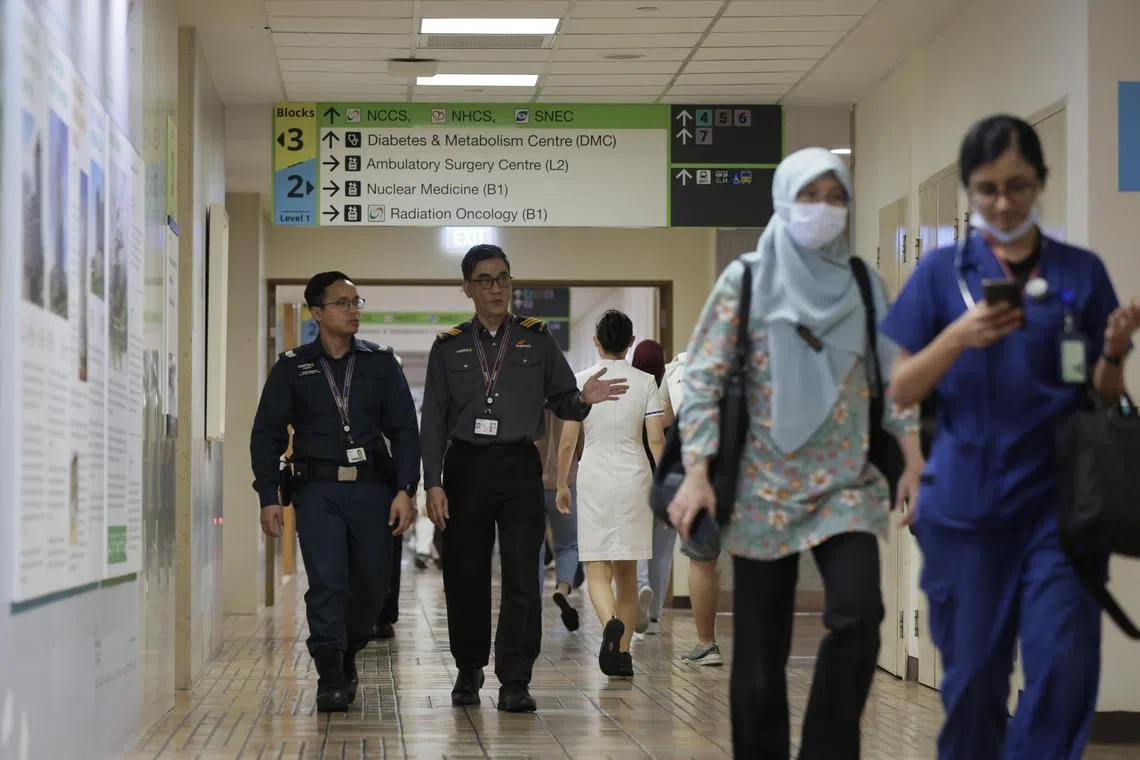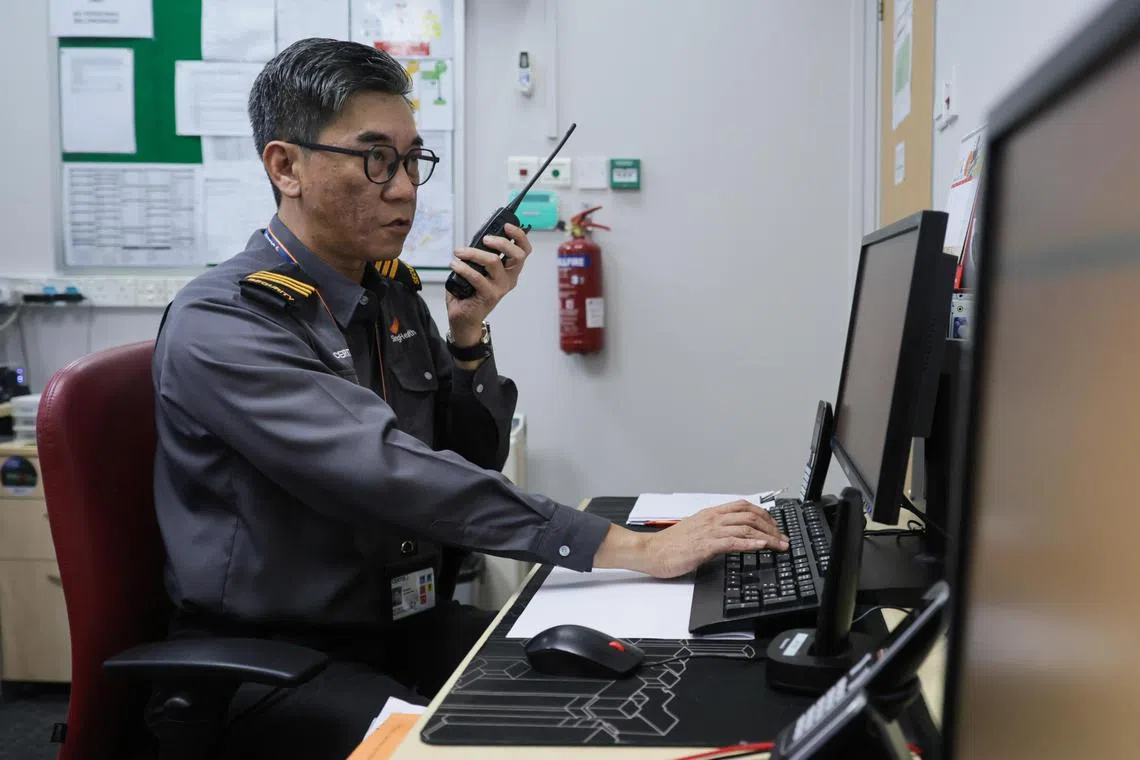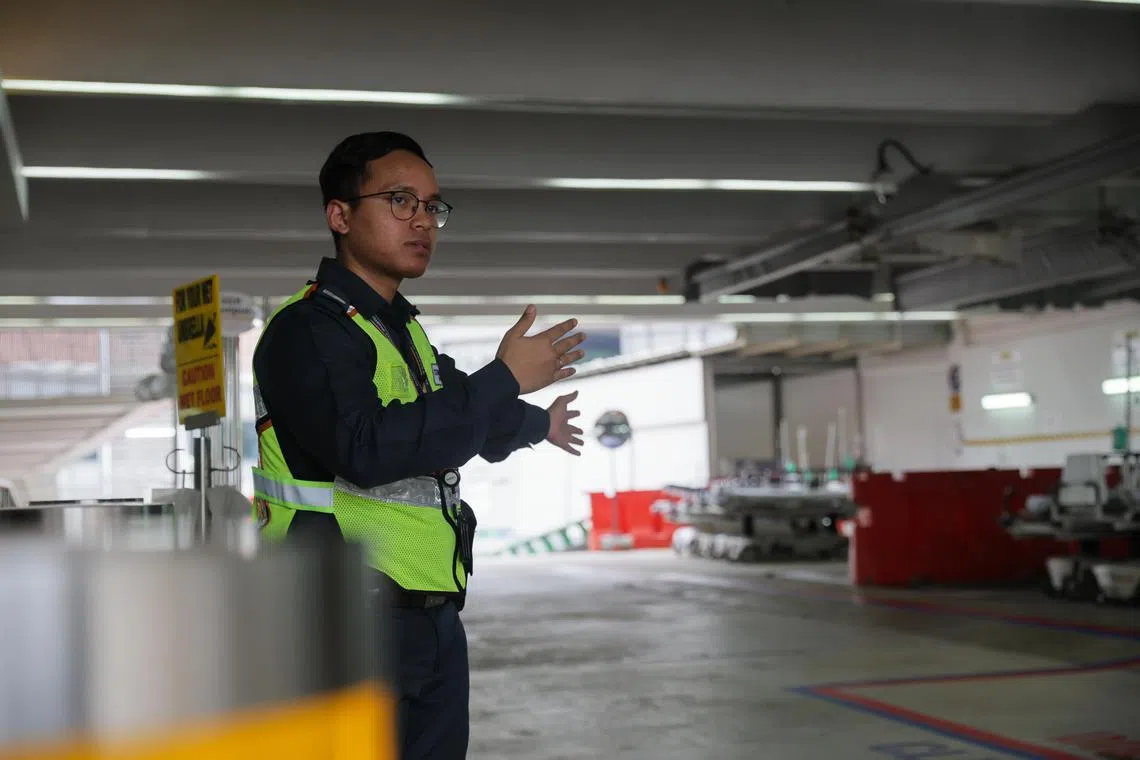In hospitals, it’s not just healthcare staff who get abused; it’s security guards too
Sign up now: Get ST's newsletters delivered to your inbox

Certis auxilliary police officer Muhammad Redhuan Azmi (left) and security supervisor Sammy Lee help provide security services and keep the peace at SGH.
ST PHOTO: GIN TAY
SINGAPORE – At the end of October, two Certis officers became victims of an alleged attack when they tried to stop a surly man from leaving the emergency department of Singapore General Hospital (SGH).
“The man was becoming increasingly agitated and started hurling vulgarities at the officers and threatening them,” security supervisor Sammy Lee, 55, told The Straits Times. He was watching the drama unfold from his seat at the hospital command centre.
Mr Lee, who started working with Certis Group 1½ years ago, sent back-up officers to help the officers and informed the police.
“By then, the thickly built man was already quite violent, attacking both officers. He punched one of them in the face, causing a cut to his lip, and his spectacles broke in two. The other officer was kicked between his legs,” he said.
“Some of the hospital staff, even the nurses, jumped into the fray to try to pin him down. That was when back-up and the police arrived. He was restrained.”
Mr Lee is among the 350 Certis officers deployed at the nearly 40 healthcare institutions and facilities in Singapore to ensure the safety and security of patients, healthcare staff and visitors.
They stand alongside other front-line service personnel, supporting healthcare staff in difficult situations, especially in environments where emotions run high.
Certis Group senior vice-president and head of group communications and marketing Robin Goh said: “On average, our security officers are activated to respond to close to 1,000 incidents every month, averaging between 20 and 30 in a single day. It is, therefore, common for our officers to be on the receiving end of abuse. These incidents can range in severity from verbal to physical abuse.”
The most recent was that involving Chinese national Han Feizi, 29. Her misdeeds were made known when videos of her arguing with the police went viral after she swore at nurses and raised a ruckus at SGH.
She was jailed, fined and deported
One in three nurses, pharmacists and other workers in the healthcare sector either witnessed or experienced abuse or harassment at least once a week, surveys and focus group discussions have found.
To protect them, the Tripartite Workgroup for the Prevention of Abuse and Harassment of Healthcare Workers issued a zero-tolerance stance on abuse and harassment.
Patients who abuse healthcare workers will be discharged from medical care by the hospital if they do not need urgent care. Caregivers and visitors who do the same will be stopped from entering the premises the next time they try to visit.
Security officers in healthcare institutions monitor closed-circuit television surveillance and alarms, patrol the premises, control crowds and manage parking. They also help visitors, respond to incidents, escort patients, manage security threats and handle a range of emergencies.

Security supervisor Sammy Lee mans the control room at SGH and when needed, helps to escalate the case to the police.
ST PHOTO: GIN TAY
However, not everyone is aware of the critical role Certis officers play at healthcare institutions and facilities.
“Security officers serve as important first responders, often faced with the task of de-escalating tensions. Their presence is also a source of deterrence, assuring employees, patients and visitors of a safe environment, and allowing healthcare staff to focus on their primary duties,” said Mr Goh.
While pounding the beat to make sure no one mistreats healthcare workers, Certis officers sometimes find themselves at the receiving end of verbal and physical abuses.
Mr Lee, who has been managing people for close to 30 years, first in the food and beverage sector, and then in sales, said his senses are heightened whenever he is at work. “This (security) sector is very challenging. I need to be sharper, more focused while on the job. It is because I need to be ready to face the many different situations.”
While Mr Lee does not carry firearms at work, his colleague, auxiliary police officer Muhammad Redhuan Azmi, 27, does. But he has never seen the need to draw his gun.
He could have when he answered a call to subdue an unnerved patient brandishing a pair of scissors.
“When I got there, my officer colleagues had already pinned the patient, so I assisted in handcuffing him before taking him out of the ward,” he said.

Part of Sergeant (APF) Muhammad Redhuan Azmi’s job is to ensure that no cars block the ramp outside the emergency department of SGH to allow ambulances to ferry patients easily to the department.
ST PHOTO: GIN TAY
In another incident, an agitated patient made insulting remarks about his parents and religion.
“I was furious, but I managed to remain calm to maintain not only my own dignity, but also the company’s good image. The situation was building, so the police were called,” he said.
Certis said its officers deployed at medical institutions undergo appropriate and comprehensive training to ensure they are prepared.
Beyond the mandatory security skills training, Mr Goh said, additional training includes first aid, Company Emergency Response Team techniques – which help them prevent emergencies from escalating into a major incident – and non-lethal self-defence.



